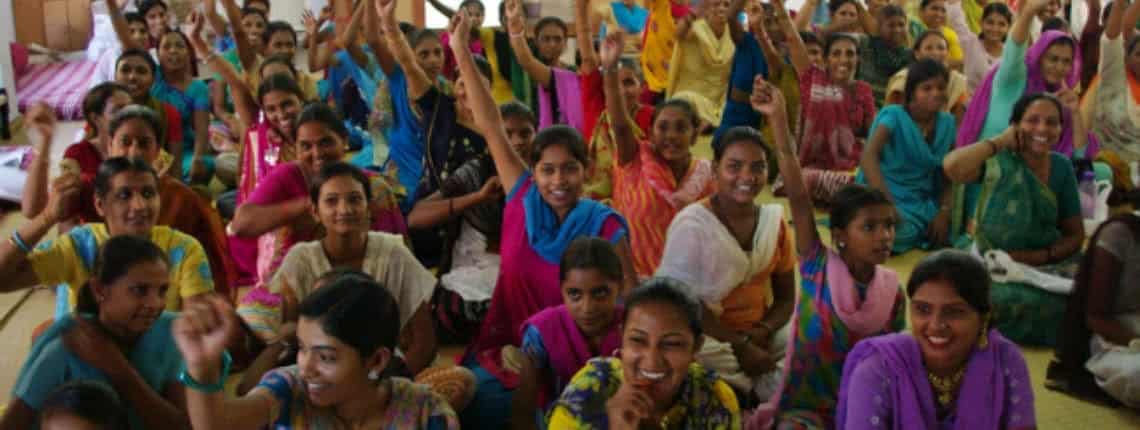In the Delhi slum of Rajiv Nagar, Nazma rises early — often before her five grown children and husband — to make tea for her family, cook homemade meals to send with them to work, and sweep their small abode.
She often wishes she could work like office workers, uninterrupted by domestic chores.
When the house empties out, Nazma gets down to business. She earns additional income for her family by tailoring women’s shirts (“kurtas”) and skirts and accessorizing some of it with her highly specialized sequining skills. She works steadily to complete orders for often tight timelines.
These orders used to be handed down from the sub-contractors, all of whom were men, who set all the demands, but Nazma banded together with the women in her area to change that dynamic — and, over time, have made enormous progress on changing local gender dynamics.
Read more about our work in India through our Delhi Focal Cities work.

Challenges of home-based working women
Working solo, even in the most cramped and crowded settlements, can be an isolating experience. Nazma spends 5-6 hours a day hunched over a sewing machine in her poorly lit home. Her sight has become strained over time, and she now struggles to stay focused as her eyes tire more easily.
Also, with all the disruptions of working at home, she rarely can stay focused for those hours. Her work day stretches on as she balances domestic duties — picking up groceries, tidying, and preparing for when her family arrives home. She often wishes she could work like office workers, uninterrupted by domestic chores, and sees finding time as one of the greatest obstacles to increasing her earnings.
In their predominantly Muslim area, women face restrictions going out in public.
Beyond these work constraints, Nazma and other women home-based workers in Rajiv Nagar face cultural challenges that are harder to tackle on their own. In their predominantly Muslim area, women face restrictions going out in public. Social sanctions from community members question the need for women to work or be out of the house.
However, the working women of Rajiv Nagar have come together to formally unite in their efforts to level the playing field and create female solidarity. “Together”, they decided, “we are stronger”.
Read more about the challenges faced by home-based workers in our Informal Economy Monitoring Study (IEMS).

Strength and solidarity: SEWA comes to Rajiv Nagar
The seed for organizing was planted in 2006, when the Self-Employed Women’s Organization (SEWA), one of the world’s largest unions of informal working women, met with women from Rajiv Nagar about infrastructural upgrades. However, SEWA leaders witnessed all the social and work challenges the women were facing and presented an idea: gain solidarity and a unified voice and vision to confront these issues.
SEWA helped the women establish a membership-based organization (MBO), and shortly thereafter, Nazma joined. Over the last 12 years, she established herself as a leader in the MBO, attending trainings and workshops thatto gaive her more leadership skills and confidence. She has worked hard to pass on what she has learned to neighbours.
Being organized has helped the women in Nazma’s area assert some independence.
Being organized has helped the women in Nazma’s area assert some independence. She herself has stopped doing purdah (a cultural practice involving covering the face and head, and staying out of sight of men and strangers) — a major achievement in the conservative community — and is able to go out and about much more easily.
SEWA also provided Nazma and other home-based workers an improved way to gain work orders without the male middlemen. SEWA connected them to its Ruuab initiative, a garment production and sourcing owned and managed entirely by women producers, ensuring an ethical and transparent supply chain. Working directly with Ruuab cuts out the sub-contractor, which both increases women’s income and reduces harassment along the way.
Read this case study on SEWA’s Ruuab initiative and how it supports home-based workers.

Organizing toward women’s empowerment
The confidence Nazma has gained over the years has clearly been passed down to the next generation. One of her daughters, she proudly notes, is currently pursuing her bachelor’s degree.
When asked what dream she has for the future for women workers everywhere, Nazma says, with a laugh, that they should be allowed to work and also spend on themselves. Only if they are allowed to pursue their dreams without any obstacles, would she consider that a win for her sisterhood.
This article is part of our month-long series for Women’s Day. Read the opening article, “Working Poor Women are Redefining How to Achieve Gender Equality.”
Feature photo: Julian Luckham
